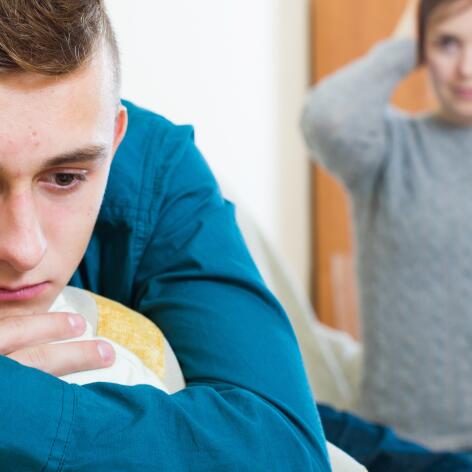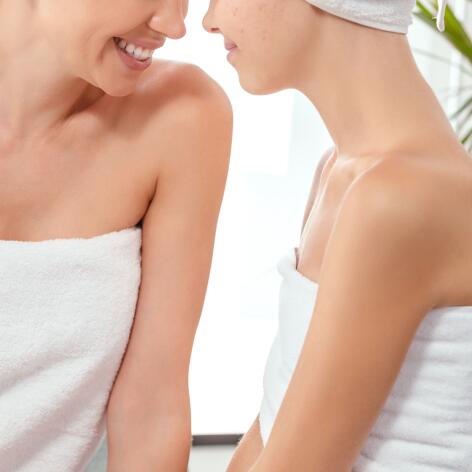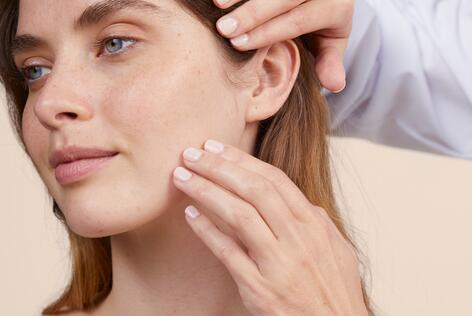Acne: supporting your teenager
Acne: supporting your teenager
Many parents dread it: the arrival of acne in their teenagers’ life, a form of dermatitis that affects 80% of teens and spoils the life of some. As well as finding the right treatment, the role of parents is to help their teenager get through this difficult period as calmly as possible and keep their self-confidence. Here are some ways to support and reassure them.
Acne: hormonal changes and self-image
Puberty leads to bodily changes linked to hormonal upheaval: from the age of 10 in girls, and a little later in boys, secondary sexual characteristics develop (hair, breasts, voice dropping, etc.). This is also the time when acne can appear on your teen's skin.
These physical signs are accompanied by psychological and behavioural changes that are completely normal. Your teenager is gradually detaching from parental influence and is taking a great deal of interest in their friends and the image they project, which is so important for teenagers in the 21st century. But when acne is involved, the psychological impact can be significant and can even contribute to your teenager withdrawing.

Supporting your teenager: establish a dialogue
Long gone are the days when you get down to your child's level and talk to them eye to eye. Now they walk right past you and avoid your gaze. They find their new body disturbing and feel burdened by their skin issues. You’d like to discuss this with your teenager, and you’re right to do so, but how do you go about it?
The first step is to establish a balanced dialogue: you can no longer talk to your teen as if they were a child, and they need to feel comfortable in the exchange. There is a small technique that proves effective: broach the subject gently... and sit next to your teen rather than in front of them. In the car or on the sofa, when you’re alone and have a quiet moment, just ask the question: "I've seen that you've got your first acne spots. Do you want to talk about it?.”

Acne: how to help it go away
Once you've discussed the subject with your teenager, it's up to you to show them that there are solutions.
Explaining the causes of acne to your teen.
Acne is caused by hormones that lead to an increase in sebum production by glands in the skin (sebaceous glands). But heredity also plays a role: the risk of developing acne is higher in people with a parent who was affected. If you were affected during your teenage years and have since regained your baby-soft skin, now is the time to talk to your teen about it! Other factors that can contribute to acne, such as stress, a diet rich in sugars or unsuitable cosmetics. Discuss the habits they might be able to change.
Encourage your teen to take care of themselves
If your teen's acne is resistant to these small changes, it's time to step it up a notch. If they feel confident enough, why not suggest that they talk to your GP? Or consult a dermatologist directly, especially if the acne becomes severe. To convince your teen (gently!), explain that the quicker the acne is taken care of, the gentler the treatment will be. Their skin will improve more quickly and long-lasting marks can be avoided (the famous acne scars).
FRIENDLY (AND EXPERT) ADVICE
Adolescence isn’t an easy time... for parents.
Your teen is changing and life isn't always easy. That goes for you, too: you might be struggling to find the right words at the right time. But even if they don't like to admit it, your teenager needs you. In particular, they need to be reminded that the smooth faces posted on social networks do not reflect reality, and that the miracle products sold unchecked on the internet are deceptive.
Your role is to guide your teen without pushing their buttons. This middle road will be easier to adopt if you had acne as a teenager and were able to make peace with that time of your life.
Acne was traumatic for me as a teenager and I didn't want my daughter to go through the same thing. So when she started to have acne, when she was about 15, I was an unhappy mother: seeing my daughter with all these pimples was difficult (...) so I quickly took her to a dermatologist to help her get her skin and life back to normal.
Myriam, 47, mother of a teenager with severe acne
The right things to do for teenage acne
If communicating with your teenager is really difficult, your first step as a parent might be to choose products that suit their skin and encourage them to use them well every day. If they see an improvement, this will only encourage them to stick with it and/or to take the next step: consult a dermatologist if necessary.

Eau Thermale Avène products designed to reconcile you with your skin
Our solutions for taking care of your acne-prone skin
- Avène Thermal Spring Water Spray
Best Seller
Thermal Spring Water
Avène Thermal Spring Water SpraySoothes - Restores the skin barrier - Calms
NEWSLETTER
We’re always here for your skin!
All our tips for daily care

Which skin care routine should you adopt?
Identify what it really needs with the help of our experts and discover the most suitable skin care routine for you.



